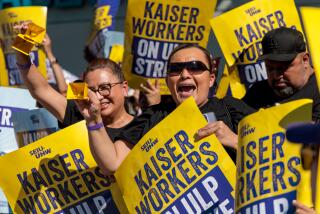Labor Leaders Agree on a Health-Care Position : Unions: Some argued for a government-run system, others wanted retention of private insurers. The final plan contains elements of both.
- Share via
MIAMI BEACH — Anyone trying to gauge how hard it is to shape a national political consensus on health-care reform would find this week’s meeting of the AFL-CIO executive council ruefully illuminating.
Even though organized labor has championed universal health coverage for half a century--and spent $3 million last year on network TV ads boosting the concept--major unions found themselves split down the middle when it came time to recommend just how the current health-care system should be changed.
A committee of executives from 16 unions deadlocked 8-8 over whether the 14-million-member AFL-CIO should lobby for Canadian-style national health insurance, run by the government, or a more politically pragmatic system that preserves the role of insurance companies while requiring all employers to provide coverage for their workers.
The deadlock was broken Tuesday when the labor federation’s 35-member executive council issued a compromise statement urging all unions to lobby feverishly for a “national social insurance program.”
The vaguely worded statement called for federal control over doctor fees, hospital charges and insurance company reimbursement schedules and a requirement that all employers contribute toward their workers’ health coverage. About 25 million American workers are uninsured.
The statement in many ways paralleled a limited reform bill being shaped by Democratic leaders in the Senate as well as some of the recommendations of the U.S. Bipartisan Commission on Comprehensive Health Care, the so-called Pepper Commission.
The split among many of the nation’s largest unions in the health-care debate was a reminder that while disenchantment with the current medical system is mounting, the obstacles to reform remain daunting.
A variety of approaches are being circulated on Capitol Hill by special interest groups, many involving strong federal controls on private medical care. The unsettled status of the issue makes it certain that Congress will pass no national medical-care bill this year, according to several key Democratic legislators who met with labor leaders at the executive council’s annual winter meeting.
The AFL-CIO--whose power to influence such debates has waned as the proportion of union workers in the workplace has sagged-found itself split philosophically:
Should it restrict its lobbying to a wholesale reform plan that lives up to labor’s historic ideals--in this case, a Canadian-style system, which would create a new government agency to guarantee equal access to medical care for all Americans but possibly raise taxes by tens of billions of dollars? Or should it lean toward the more limited reforms of the existing health-care system being pushed by Senate leaders?
AFL-CIO President Lane Kirkland and organized labor’s chief spokesman on health care, Service Employees International Union President John Sweeney, favored an incremental approach. They emphasized the need for reform measures that can be passed by Congress as quickly as possible.
“Our members simply cannot afford another year of impasse and delay,” Kirkland said Sunday in a speech to an American Medical Assn. leadership conference here.
Soaring health costs have skewed the collective bargaining system, workplace experts note. The prime issue in the vast majority of strikes during the past several years has been management’s demand that workers for the first time pay a share of their annual medical premiums.
Insurance costs are rising 20% a year, and many American corporations now spend an amount equal to one-fourth of their net earnings to provide employee medical coverage, according to a recent study by a Washington consulting firm.
The most recent example of such friction is a threat by 235,000 brake operators, engineers and freight rail workers to strike in April. The 12 unions that represent the workers are refusing the railroads’ demand that the workers begin paying part of their health-insurance premiums.
Unions that favor Canadian-style reforms--among them the United Auto Workers and unions representing textile, garment and communications workers--were frustrated by the middle-of-the-road approach favored by the labor federation. Some of these partisans were annoyed that Kirkland had pointedly told the AMA on Sunday that “a new sense of pragmatism seems to be taking hold” in organized labor.
To pacify those unions, the AFL-CIO compromise statement released Tuesday said labor will lobby for universal medical coverage--including coverage for the unemployed--but acknowledged that aim “may come about in stages.”
The statement also called for reducing the Medicare eligibility age to 60 from 65 to put the program “in line with the average retirement age.”
More to Read
Get the L.A. Times Politics newsletter
Deeply reported insights into legislation, politics and policy from Sacramento, Washington and beyond. In your inbox twice per week.
You may occasionally receive promotional content from the Los Angeles Times.










